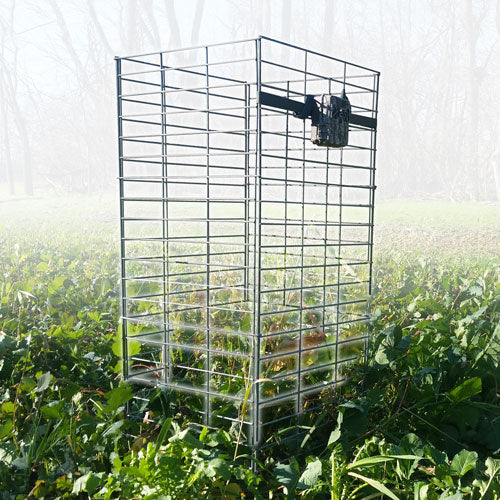Real World Giant Miscanthus
We take orders for Giant Miscanthus January - March
QUICK ANSWERS TO COMMON QUESTIONS:
1.) How will it do in wet areas that flood?
Answer: Not good – this product does not like wet feet. Consider Switchgrass.
2.) How much sunlight do I need?
Answer: Think of Real Worlds Giant Miscanthus as you would corn. Giant Miscanthus and corn require the very same growing conditions. Both need full sunlight, adequate rainfall, and freedom of competition from trees, weeds, etc.
3.) Can I dig up and replant rhizomes and transplant to other areas?
Answer: NO! The Giant Miscanthus that Real World sells is a patented cultivar and protected by patent laws. Real World works closely with and under the supervision of the patent holder who requires us to report any sales over a certain volume. This is no different than the patented technology in the agricultural seed industry where harvested grain seed cannot be replanted.
4.) How many Real World Giant Miscanthus Rhizomes do I need?
Answer:

ABOUT REAL WORLD GIANT MISCANTHUS:
For years our customers have been asking us if Real World was ever going to come out with a plot screen product. We tested a lot of different annual plant species but they all fell short (pun intended) of earning the Real World label. While some looked great while growing and early in the fall, they would all fall over once the plants died. We refused to sell a product that we knew would ultimately not do what was expected of it.
Real World Wildlife Products president Don Higgins first planted miscanthus grass on his farm several years ago and was so impressed with what he saw and the potential that this plant offers the wildlife land manager that he put in considerable time and effort learning more about this extremely tall grass. When he discovered that there are different varieties of miscanthus he arranged for the Real World team to visit different university, corporate and private test plots around the country. After looking at numerous miscanthus cultivars the Real World team focused on one specific variety that they felt would be the very best for screening and other habitat applications. They then negotiated with the patent holder of this specific variety and ultimately signed a contract to market it. MAKE NO MISTAKE, REAL WORLD GIANT MISCANTHUS IS DIFFERENT THAN OTHER MISCANTHUS! It gets as tall as any other miscanthus but has more leaf for better screening. Dare to Compare!
What is miscanthus?
Miscanthus is a woody perennial grass native to Asia that typically grows to heights of 12’ plus. It produces bamboo-like stalks which average 3/8” in diameter. It is a non-invasive grass that does NOT produce viable seeds. Because of the huge yields it produces per acre, miscanthus is used primarily for bio-fuel production. Miscanthus is a cold hardy grass that grows rapidly, has low nutrient requirements and has few pests or diseases.
How is miscanthus propagated (grown)?
Miscanthus is established by planting pieces of root called “rhizomes’. Since it is sterile and it must be propagated by rhizome division rather than by seed. The rhizomes are planted about 4″ deep and spaced 18” apart and in rows that are spaced 18”-24” apart. Each plant will spread 4”-6” per year and fill in the rows to create a dense hedge. For a good screen plant 3-5 rows.
Can I grow Real World Giant Miscanthus in my area?
The specific cultivar of miscanthus known as Real World Giant Miscanthus has been grown successfully from the Gulf of Mexico into southern Canada. It is tolerant of both the tropical heat in southern states as well as the colder northern regions of the United States.
How do I go about establishing Real World Giant Miscanthus on my property?
Miscanthus rhizomes should be planted in the spring once the soil can be worked. A well-tilled bed does help the roots establish quicker, but is not necessary. The rhizomes should be planted 4” deep and spaced 18” apart in rows that are spaced 18”-24” apart. Remember, every year these plants will expand approximately 4″ in each direction. Good results can be achieved on a wide range of soils but the key is moisture. Adequate moisture and 60° ground temperature will promote good growth. Miscanthus can tolerate a wide range of soil pH but performance is best between 5.5 and 7.5 pH. Sandy soils only yield well if rainfall is adequate due to its dry nature. Weed control is important during establishment. Do not worry as much about grass competition, but more so with broadleaf weeds during the first year of establishment. Most common corn herbicides will be fine to use on miscanthus – Dual, Atrazine, 2,4-D etc. It is a good idea to spray a herbicide like atrazine right after planting your rhizomes in a weed-free seed bed.
How should I store my miscanthus rhizomes?
We strongly encourage you to have your planting site ready and plant your rhizomes as soon as possible after receiving them. Rhizomes can be stored for 2-4 weeks in a refrigerated storage unit. The colder temperatures keeps the rhizomes dormant and slows the growth. Do not put rhizomes in the freezer. Rhizomes need to be kept dormant until you are ready to plant them. Keep them in cold storage, between 35 and 45 degrees to maintain their dormancy. These rhizomes should be treated like bare-root tree seedlings, meaning they need to be kept moist, but not wet. Place your hand in the bag, if you feel some moisture, that’s great. If they look dry, spray them with water. Cut the bottom of the bag to allow water to drain, you do not want them over-saturated either.
What kind of growth should I expect from my Real World Giant Miscanthus?
The first year each individual rhizome should produce 1-3 stalks that will be anywhere from 1’-8’ tall depending on location, soil and weather conditions. The second year you should see 5-7 stalks from each plant that will be anywhere from 4’-12’ tall. By year three each cluster’s should be approximately 14″ diameter with about 20-25 stalks and 10’-12’ tall. After this the individual clusters will start growing into each other and filling in any gaps. These figures are an “average” and you may see better or worse results based on your location, weather and soil type. By year three you should have great screening cover although it can be very adequate before that.
How do I maintain my miscanthus and should I fertilize?
Do not fertilize Real World Giant Miscanthus the year it is planted. A light to moderate amount of high nitrogen fertilizer such as urea (46-0-0) can be applied for increased growth in the spring after the first year.
How can I create the best screen possible on my hunting property?
For years Real World customers have been using Real World switchgrass to create screening cover. Now with Real World Giant Miscanthus you can combine the two tall grasses to create the ultimate screen. Start the fall before you intend to plant by creating a 12’-15’ wide seed bed where you want your screen. In late winter, frost seed Real World switchgrass into your seed-bed at a rate of no more than 4# per acre. As early as possible in the spring, plant 3 rows of Real World Giant Miscanthus in this same seed-bed. Plant the first row of miscanthus right down the middle of the seed bed and then a row 2’-3’ on each side of the middle row. Control weeds the first year by using an application of atrazine at a rate of 1-quart per acre as early as possible in the spring. If broadleaf weeds become an issue later in the summer, spray with 2-4D. Once established you will have the very best screen possible outside of a solid wall.
PLANTING INSTRUCTIONS
KEEP THIS PRODUCT BETWEEN 35-45 °F UNTIL READY TO PLANT
Site Prep – Choose a planting site that gets full sunlight and is a good distance away from trees and other competing vegetation. Think of miscanthus as corn when selecting a planting site; a location where corn would do well is a site where miscanthus will do well. Miscanthus will do best in soils and moisture conditions that are also good for corn. It is very important that the planting site be totally free of weeds and grasses before planting. You must use a herbicide to do this as disking, plowing or tilling will not kill the root-system of grasses that can out-compete your miscanthus. If you do not first properly prepare the planting site, all other efforts are wasted. Take the time to select a good planting site and then prepare it well ahead of planting. Keep in mind that it takes a minimum of three years for a new miscanthus planting to reach its full potential.
Planting –plant as soon as soil conditions allow in early spring and no later than mid-June. Rhizomes should be planted 3-4” deep and 12-18” apart in rows that are spaced 18-24”. Plant at least 3 rows for good screening, 5 rows is better. Lay the rhizomes horizontally so all of it is 3-4 inches deep.
Weed Control – It is very important to control competing weeds within a new miscanthus planting for at least the first two years. Apply a pre-emergence herbicide immediately after planting and maintain the pre-emergence herbicide barrier by making a second application 30-45 days after the initial application. Harness Xtra is a pre-emergent that is labeled for giant miscanthus. Simazine can also be used.
Fertilizer – Do not fertilize Real World Giant Miscanthus the year it is planted. A light to moderate amount of high nitrogen fertilizer such as urea (46-0-0) can be applied for increased growth in the spring after the first year.
Warning – Real World Giant Miscanthus is a patent-protected cultivar. Real World is licensed by the patent holder to market this specific variety of miscanthus. It is illegal to propagate Real World Giant Miscanthus. Real World Wildlife Products will work closely with the patent holder to protect their interest and investment.








